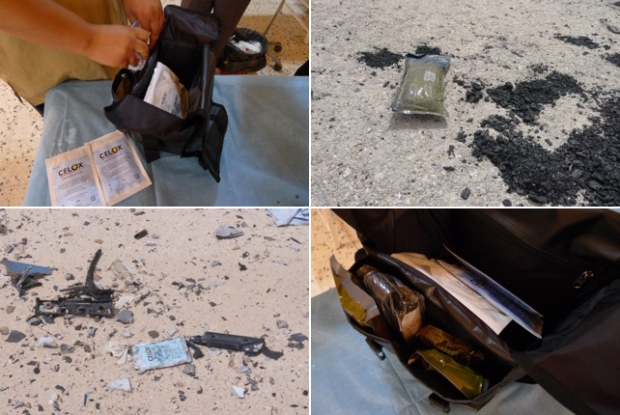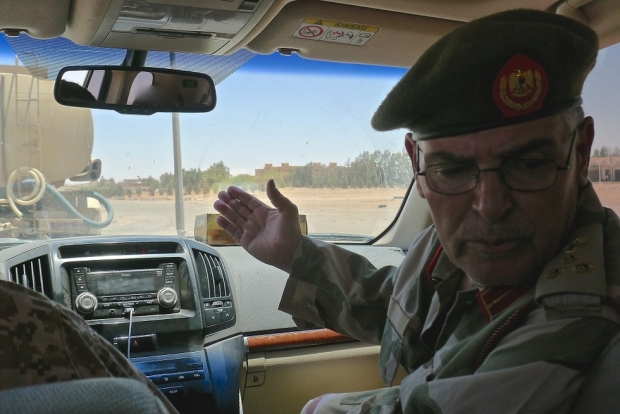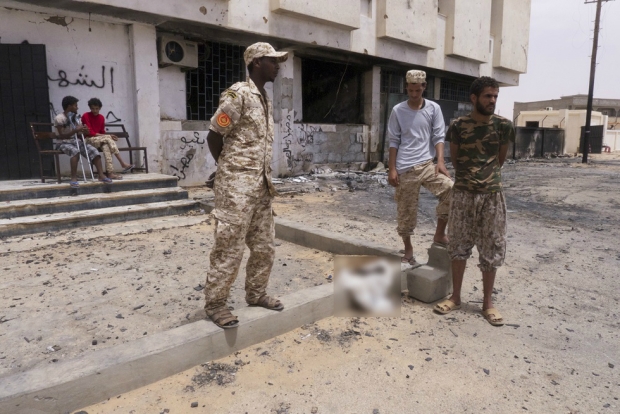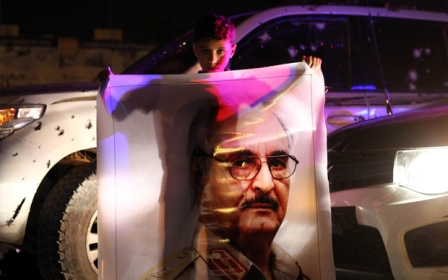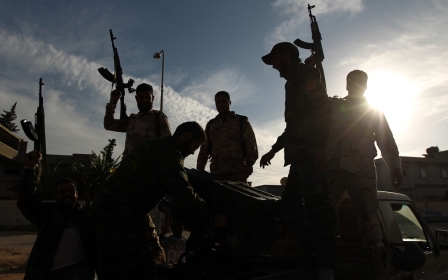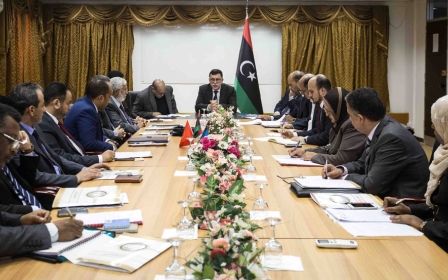EXCLUSIVE: British soldiers 'fighting IS on frontlines near Libya's Sirte'
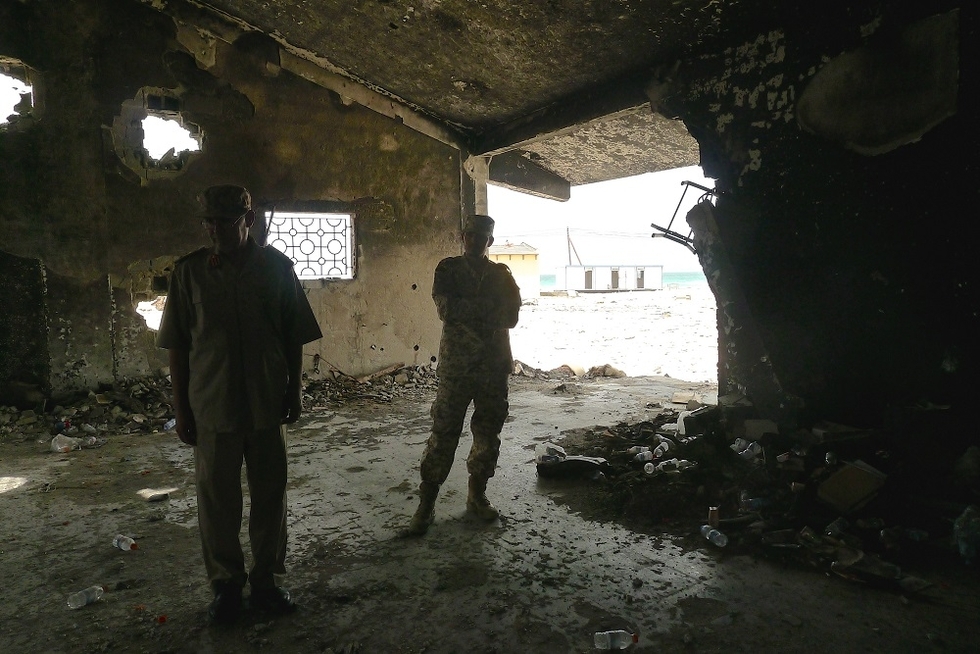
MISRATA, Libya - British commandos are supporting Libya’s battle against the Islamic State (IS) in Sirte, reportedly fighting and directing assaults on the frontlines and running intelligence and surveillance from a base in Misrata, according to Libyan soldiers.
The UK government has refused to comment on special operations, leaving the British public in the dark about its role in Libya. On the ground, however, Libya’s young soldiers say the military personnel they call the "friends" have helped save many lives.
There are reportedly more British personnel based in Misrata, supporting surveillance and intelligence operations.
Aimen, 26, told Middle East Eye: “Daesh call their suicide bomb vehicles ‘dogma’ and they are often reinforced with bullet-proof steel. I was fighting side by side with the British when they destroyed one of these.
“We were shooting at it with our all weapons but even our missiles made no impact. But the British guys had a gun with bullets that melt through the armour. When they hit it, the dogma exploded immediately.”
Another young fighter, Seraj, told MEE: “Recently we hadn’t been making advances, until they have given us the green light."
“Last week, they were here giving some intelligence and co-ordinates so we could advance, because they have a drone that they use to detect enemy positions,” he said.
“They are not here all the time but normally we see them every few days.”
Latest: France confirms deaths of soldiers in Libya
The stories from the Libyan soldiers contradict official British government statements that its forces are not involved in frontline fighting in Libya.
In May, as reports emerged of British troops destroying an IS suicide vehicle in fighting near Misrata, the defence secretary, Michael Fallon, told the House of Commons that Britain was not planning "any kind of combat role" for its forces in Libya.
The evidence and comments obtained from around Sirte appear to contradict that statement.
The foreign special operations teams have also provided medical kits and safety equipment. One doctor working at a field hospital at a time when essential medical supplies were running low, said that he asked one of the British soldiers if they could be of any help.
"We had almost nothing in the field hospital and we asked the British soldiers if they could help in any way,” said a surgeon who gave his name only as Dr Khalid.
“One soldier asked a lot of questions about the stocks we had and what we needed but said he couldn’t promise anything. The next day they came back with 40 field kits.”
The small black holdalls were each packed with emergency supplies for treating battlefield wounds - including double tourniquets, valves to treat collapsed lungs and fortified bandages and homeostatic agents to prevent blood loss.
Pictures obtained by Middle East Eye show packs of Celox, which staunches bleeding, littered around the remains of a field hospital in Bayrat Laysoon, 60km from Sirte, where 32 people were killed and more than 100 wounded in a huge suicide blast in June.
“It was one night when there was heavy fighting and the next day we were planning a major offensive,” recalled a young fighter named Abdusalem.
“They had a van full of flak jackets and helmets and we made a long queue and the men gave us each a set.”
He estimated about 300 sets were handed out on the front line where he was fighting, and said more were distributed to fighters on other front lines.
“I can’t be absolutely sure if they were British or Americans who gave us the equipment because I don’t speak English and can’t tell the difference between the accents but, anyway, they are working here together,” he said.
Abdusalem said, although there still were not enough vests to go around, most military units now had a small number, which they used whenever there were fierce clashes or when the forces made further advances into central Sirte.
“Really, England has helped us a lot and their help has been crucial in our successes so far at defeating IS,” he said.
“Without their help, IS would have killed many more of our forces and, personally, I want to thank the British government, a lot.”
Libyan forces, operating under the UN-backed Government of National Accord (GNA), launched an offensive against IS in May after the group tried to extend its territory towards Misrata. Foreign personnel were spotted on the front lines within a few weeks.
IS have used more than 35 suicide bomb vehicles against GNA troops since early May. The biggest was the Bayrat Laysoon area attack. On another occasion, there were three separate attacks in a single day.
But for Libyan fighters lacking experience and equipped with Soviet-era weapons, intelligence reports are not always enough.
In the latest major IS suicide attack outside Sirte, a Toyota Land Cruiser packed with explosives targeted a police station in the small town of Abu Grain, killing 10 officers and injuring 15 more.
Although the police station had been given an intelligence report three days earlier indicating there was a threat, the early morning blast caught them off guard.
“We were awakened early in the morning by the sound of a vehicle slamming on its brakes, followed by a massive explosion that blew out all the windows and knocked down a wall,” police officer Moussa Ibrahim said.
"The bodies of three of our colleagues who had been stationed outside were thrown into our room through the broken windows.”
Even a week after the blast, incinerated body parts of victims were still being found, hundreds of metres from the scene of the attack.
“The vehicle came from the south, not from Sirte,” Ghossri said, admitting this was a worrying indication that not all IS adherents in Libya were penned inside the 15 square kilometres of central Sirte the group still occupies.
“We know that there are IS sleeper cells in other parts of the country, but we know our job very well now, and we will track down every last one of them,” he said.
This article is available in French on Middle East Eye French edition.
Middle East Eye propose une couverture et une analyse indépendantes et incomparables du Moyen-Orient, de l’Afrique du Nord et d’autres régions du monde. Pour en savoir plus sur la reprise de ce contenu et les frais qui s’appliquent, veuillez remplir ce formulaire [en anglais]. Pour en savoir plus sur MEE, cliquez ici [en anglais].


